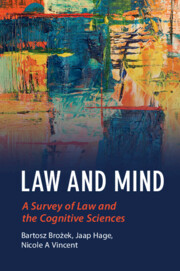Book contents
- Law and Mind
- Law and the Cognitive Sciences
- Law and Mind
- Copyright page
- Contents
- Figures
- Contributors
- Acknowledgements
- 1 Introduction
- I Metatheory and Methodology
- II Ontology and Epistemology
- III Legal Doctrine and Cognitive Sciences
- IV Evidence
- V Dissenting Opinions
- 22 A Non-Naturalist Account of Law’s Place in Reality
- 23 The Law and Cognitive Sciences Enterprise: A Few Analytic Notes
- 24 The Cognitive Approach in Legal Science and Practice: A History of Four Revolutions
- References
24 - The Cognitive Approach in Legal Science and Practice: A History of Four Revolutions
from V - Dissenting Opinions
Published online by Cambridge University Press: 21 April 2021
- Law and Mind
- Law and the Cognitive Sciences
- Law and Mind
- Copyright page
- Contents
- Figures
- Contributors
- Acknowledgements
- 1 Introduction
- I Metatheory and Methodology
- II Ontology and Epistemology
- III Legal Doctrine and Cognitive Sciences
- IV Evidence
- V Dissenting Opinions
- 22 A Non-Naturalist Account of Law’s Place in Reality
- 23 The Law and Cognitive Sciences Enterprise: A Few Analytic Notes
- 24 The Cognitive Approach in Legal Science and Practice: A History of Four Revolutions
- References
Summary
This chapter addresses the issue of cognitive revolutions within law. The cognitive revolutions in question consist of a systematized attempt to apply the methods or findings of natural sciences to legal research and practice. The impact of cognitive science on law is only the most recent example of such a development. The first cognitive revolution identified in the chapter arose in opposition to the idea of the ‘science of understanding’ (Verstehenswissenschaft). This cognitive revolution was grounded in the philosophy of logical empiricism, prominent in the twentieth century, and it resulted in various realist conceptions of law. The second cognitive revolution pertained to problems such as the existence of moral norms and legal rules, the nature of normativity, the interpretation of concepts such as necessity, obligation and entitlement and, finally, normative meaning. The consequence of this revolution were numerous analytical conceptions in legal philosophy which adopted a naturalistic understanding of cognition. The third cognitive revolution no longer appealed directly to naturalism but rather to the issue of interdisciplinarity. The project of making at least part of the humanities and social sciences more scientific was meant to be carried out by opening them to other disciplines that met scientific criteria, particularly psychology, sociology and economics.
On the one hand, contemporary applications of the cognitive science to the law – the fourth cognitive revolution – are certainly influenced by the above-mentioned earlier developments. On the other hand, however, the proponents of the fourth cognitive revolution are somewhat distanced from those earlier discussions, putting forward not only their own conception of cognition but also their own vision for the reconstruction of the humanities and social sciences in general and legal sciences in particular.
Adopting this historical perspective, the chapter tackles the issue of what contemporary cognitive science can offer legal science and practice. Several potential consequences of the fourth cognitive revolution are discussed, which include a redefinition of some legal concepts related to cognition, such as guilt, responsibility, will, intent, error, consciousness and liability.
- Type
- Chapter
- Information
- Law and MindA Survey of Law and the Cognitive Sciences, pp. 507 - 520Publisher: Cambridge University PressPrint publication year: 2021

